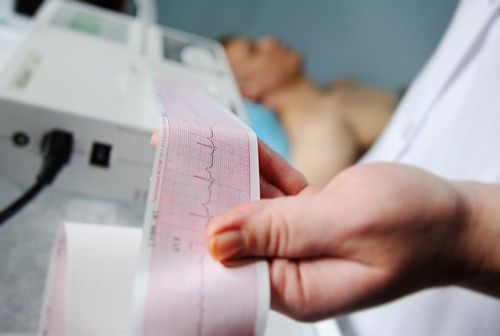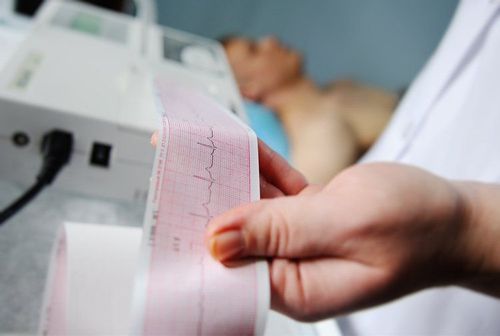This is an automatically translated article.
Examination is necessary when you have doubts about your heart health. Before going to the doctor, if you know the content of cardiovascular consultation, it will help the examination process be convenient and do not take much time. The content of cardiovascular consultation will revolve around the patient's pathology based on the clinical and laboratory test results and the patient's questions.
1. Cardiovascular consultation like?
Cardiovascular consultation is a very important aspect of medical treatment. During a cardiac consultation, your doctor will evaluate your medical history, past history, perform a complete physical exam, and do some additional tests needed to assess your risk of developing heart disease. Early diagnosis can have a better prognosis and reduce dangerous complications.
The purpose of cardiovascular screening and counseling is to help the patient discuss heart problems, present symptoms and know possible complications. The doctor will advise on treatment regimens, measures to prevent complications and help patients build a healthy lifestyle. You need to see a cardiologist when experiencing problems such as chest pain, high blood pressure, shortness of breath, heart palpitations, diabetes, chronic kidney disease, family history of cardiovascular disease, ...
SEE ALSO: CARDIOUS DISEASE: EARLY SCREENING TO AVOID RISK OF CARDS
2. Cardiovascular consultation contents
2.1 Ask the patient The first thing in every examination process is to exploit administrative information. You need to provide the doctor with personal information such as your first and last name, hometown, contact phone number, etc. Next is information about your medical history in the past and your family history. , along with the current state of the symptoms you are experiencing.
Therefore, in order for the examination to take place smoothly, you need to answer honestly and accurately. Besides, you should learn about your medical condition to prepare all the questions you want to ask your doctor. Before the consultation, you should list and write down those questions, in case you forget everything when you go to the doctor.
In addition, bring along the diagnostic results, prescriptions, test results such as echocardiogram, ECG, stress test, CT scan, MRI scan, ... of previous visits, to Your doctor can continue to monitor your condition.
2.2 Physical Examination Based on your medical history and the symptoms you are experiencing, your doctor will perform a complete physical exam to assess the extent and confirm and make a diagnosis. During the examination, please coordinate with the doctor to make the process go smoothly and with high accuracy.

Người bệnh sẽ được thăm khám lâm sàng bệnh tim mạch cùng bác sĩ
2.3 Do some laboratory tests Some diagnostic tests for cardiovascular diseases are done to confirm:
Cardiac angiography: usually done for patients with signs of heart disease. sign of coronary artery disease. This test uses X-ray images to examine the blood vessels or chambers of the heart for plaque or other problems. In this test, the doctor uses a catheter that is inserted into the blood vessels in the upper thigh or arm and threaded into the heart. The doctor then uses a contrast dye injected into the blood vessel to light up the arteries and thus see. As the contrast dye flows into the artery, X-ray images are taken. Echocardiogram: the doctor uses sound waves to create images of the heart, and these images help determine the size, strength of the heart muscle, the presence of heart valve disease and heart disease. An image of the heart is displayed on the screen of the ultrasound machine, allowing the doctor and the patient to see during the examination. Stress test: this is a diagnostic test to determine exercise activity and cardiac tolerance. The patient was asked to use a treadmill while the doctor performed the ultrasound and measured changes in blood pressure. This test is done primarily to detect the cause of chest pain, shortness of breath, or a rapid heart rate. Electrocardiogram (ECG): Electrodes are placed in the upper body and legs of the patient to capture the electrical signals of the heart. An electrocardiogram test helps to determine the heart's function, rhythm, irregularities of the heart rhythm and also determines if the heart is enlarged or damaged. This test is done on patients who feel chest pain, palpitations, dizziness, and shortness of breath.
2.4 Diagnosis and consultation, treatment After the results of the laboratory tests, your doctor will create a plan for further evaluation or treatment for you. Your doctor can also build you a healthy lifestyle such as losing weight, increasing physical activity, quitting smoking, alcohol and lowering cholesterol. If you've been diagnosed with coronary artery disease, your doctor will recommend coronary artery bypass grafting, angioplasty without or with stents, and coronary artery bypass graft surgery. These surgeries will help reduce the risk of cardiovascular disease such as heart attack or death.
In addition, the doctor will make recommendations for effective treatment methods, plans related to cardiovascular care, as well as prevention of possible cardiovascular disease complications. Along with that is answering questions about the patient's medical condition.
In summary, cardiovascular counseling is necessary and important for patients with cardiovascular diseases. The content of the consultation will revolve around the pathological problem based on the clinical and laboratory tests and the patient's questions. This helps patients better understand their condition, as well as effective treatments and care plans at home. From there, it will be more convenient for the patient's response to treatment. Therefore, you should have regular health check-ups, especially when symptoms such as shortness of breath, chest tightness, dizziness, etc., need to go to a medical facility immediately for support and advice. , timely treatment.

Thăm khám sức khỏe định kỳ giúp phát hiện sàng lọc sớm bệnh tim mạch
Cardiovascular disease has a great impact on quality of life and has a high risk of mortality, but patients can completely minimize the risk and improve quality of life by early examination and treatment. prompt treatment at a reputable and highly specialized facility in cardiology.
In order to help the patient's cardiovascular disease treatment be convenient, optimal in terms of effectiveness, process and treatment cost, Vinmec International General Hospital has deployed intensive Cardiology examination packages. with the examination, screening and treatment process, gives patients the following benefits:
Being treated and cared for according to the standard professional protocol of the prestigious Cardiology Association in the world Early diagnosis of disease, treatment with high results, shortened hospital stay, optimized costs Treated by a team of doctors from many specialties and nurses who agree to implement a comprehensive treatment plan, according to a standard protocol throughout the hospital stay, instead of having only one main doctor or one treatment specialty as before. Being treated according to the best regimen, without having to try different treatments that are time-consuming and expensive for patients Ensure good treatment results and peace of mind, proactive about treatment costs for patients sick
Please dial HOTLINE for more information or register for an appointment HERE. Download MyVinmec app to make appointments faster and to manage your bookings easily.













